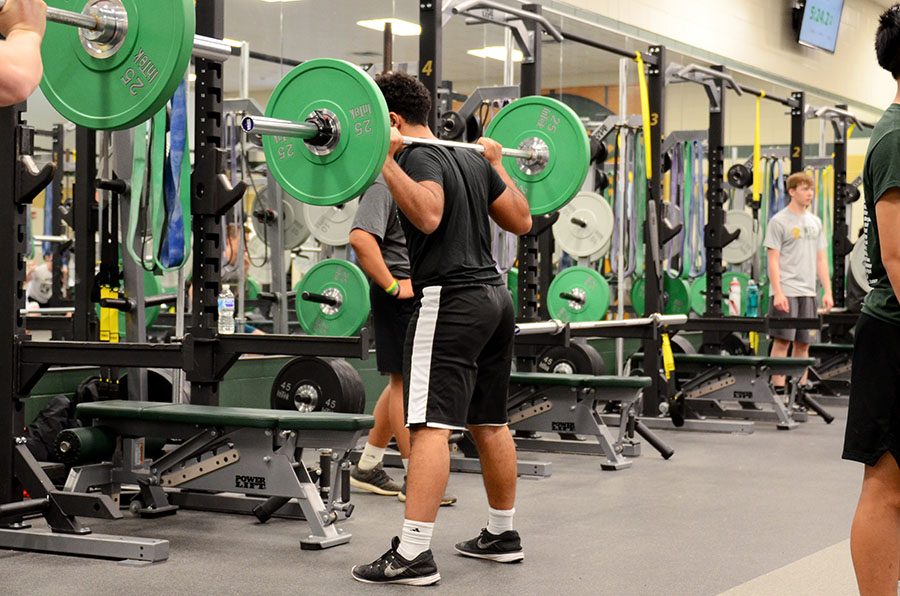Running on empty
West Side Story looks at how fasting during Ramadan affects Muslim students at West High in their academics and athletics.
Ali Alwahdani ’20 back squats during his football weightlifting session.
Imagine not eating a single morsel of food from sunrise to sunset. In some cases, even drinking water is prohibited. Now imagine having to go through that process every day for an entire month. Fasting during the month of Ramadan is a widely practiced Islamic tradition that affects many Muslim students at West High.
The month itself is based on a lunar calendar, so the date is always changing. In recent years, Ramadan has slowly crept into the school year consequently affecting the lives of students who choose to fast in varying degrees.
The main idea behind Ramadan is that it will teach patience, endurance and thankfulness for what one has. These are goals that many fasting students agree is more successfully reached through being simultaneously pitted against academic challenges.
“Ramadan is a holy month where Muslims are busy doing good deeds and acts of kindness, and spend their time with their families and doing religious devoirs,” said Amina Ahmed ’20, who is fasting this year.
In 2019, Ramadan will almost completely take place during the school year, ending on June 4. Using excessive brain power without fuel is very taxing on a high school student striving to maintain their academics.
Ahmed remarked, “Ramadan in school is cool, but I wish [in school] we could get the first week of Ramadan off, it will make people less stressed out because we can get used to it and adjust mentally and physically.”
As the third trimester nears its end, teachers dole out finals exams like candy. Students scramble to study and prepare for the chaotic storm that is AP testing.
“To be honest, I’m a bit nervous that AP testing weeks are in Ramadan this year because it will be my first year to be under so much stress and pressure while fasting,” said Ahmed.
While being occupied with fasting and other Ramadan customs, Ahmed will have to contend with homework, projects, essays and studying for finals.
“Thinking ahead to what or how I’m going to through the last month, gives me some goosebumps,” she said.
Usually, Ahmed’s family has a unique day schedule they follow. The schedule includes staying awake until sunrise and sleeping far into the day. This is because, in Ramadan, it is necessary to get up to do a very early breakfast at around 3:45 am after which the fast officially starts. The schedule such as the one Ahmed has allows for the fasting person to remain asleep for most of the duration of the fast.
Unfortunately, the timing does means that Ahmed is unable to participate in her schedule this year due to school.
This also brings up Ahmed’s concern of spending unavailable energy over the course of a long spring day.
“By the time I come home, I would be exhausted and I might lose some motivation to start my homework, projects, studying for tests, etc.,” Ahmed explained, “And worse, after Iftar, I would be tired and since I just ate, I need a good two hours to relax.”
During Ramadan forgetfulness comes into play as well. Last year, in the early stages, Ahmed’s little sister causally offered her some gum.
“I took it and chewed the gum normally. After a good twenty minutes, I realized that I was hungry and thought I should eat,” Ahmed recalled. “But then I realized that I’m fasting, and I was chewing gum for the past twenty minutes.”
After realizing this, Ahmed immediately spit out the gum and rinsed her mouth. Her quick thinking let Ahmed keep her fast.
“I remember last year, it was kind of stressful to be super active and busy and I didn’t have a lot of strength,” Ahmed said. “Thankfully, my teachers were very understanding and cooperative with me.”
In regards to what she does to cope, Ahmed commented, “Nothing special, but I stay really positive and do acts of kindness.”
To her fellow fasting West High students that must deal with its challenges, Ahmed had to say this, “The last month of school will be tough, but I hope we’re going to be spectacular.”
Ramadan also affects athletes who are competing and practicing during their fast. Without proper nutrition, athletes can become sluggish and lose focus.
Many athletes choose to break their fast on days they know they will be working out, with the intention that they will make up the days in the future.
Ali Alwahdani ‘20 has struggled in the past balancing the intense football off-season with his decision to fast for Ramadan.
Alwahdani is staying active during Ramadan this year with weightlifting and football workouts. His parents have worked out a schedule that allows him to break his fast with the plan to make up the days later.
“My parents don’t really want me fasting on days when I have practices or games,” said Alwahdani. “I’m gonna end up fasting three or four days a week until football really starts.”
Being an American athlete fasting during Ramadan can be especially difficult because of the lack of solidarity among teammates.
Alwahdani has visited Jordan during Ramadan in the past and feels that the urge to break your fast is much greater in the United States than in regions where participation in the fast is widespread.
“It can be tempting, especially here where the majority of people don’t fast,” said Alwahdani. “It really tests your self-control and your discipline.”
Professional athletes have long struggled with the decision to fast during their seasons. NBA center Enes Kanter made the decision to observe Ramadan during the NBA playoffs this year despite the pressure from fans and teammates to stay committed to his sport.
“This year I am testing the limitations of my bodily strength in a way I never have before,” said Kanter in his opinion piece to the Washington Post. “But I’ve also come to understand my potential and how inner strength can translate to triumph.”
West High Muslim athletes participating in track and field, soccer and tennis will have to balance their competition season with their Ramadan fasting this year.
One such athlete is Mussab Musa ‘20, a boys soccer player who has been fasting for Ramadan since he was 12 years old.
Musa breaks his fast on days when he has a game, but has been fasting through his practices during the first week of Ramadan.
“Honestly it’s not that bad, your mouth just gets really dry,” said Musa. “The first week is gonna be kinda hard but after a while you get used to it.”
The key to staying energized for Musa is relaxing and staying indoors to conserve energy before he has to practice.
Similar to Alwahdani, Musa plans to make up the days he breaks his fast after the season is over. He also feels non-Muslims should give fasting a chance to understand the simple things we take for granted.
“People need to learn how grateful food is because there’s some people who don’t have it,” said Musa. “I encourage people that don’t celebrate [Ramadan] to try fasting and see what it’s like.
Your donation will support the student journalists of West High School. Your contribution will allow us to purchase Scholarship Yearbooks, newsroom equipment and cover our annual website hosting costs.

Joe is in his second year working for the West Side Story publications as the sports editor. Joe plays golf, basketball and runs track at West High. He...




Grant Henderson • May 13, 2019 at 1:37 pm
This is a really great piece. Love the work that this writer put in.